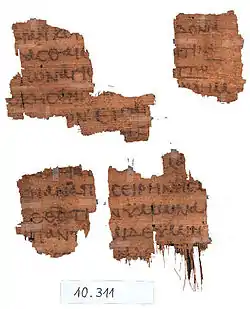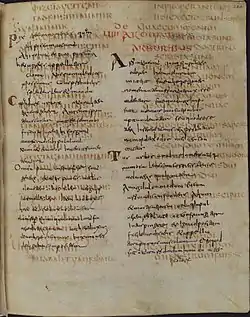| Romans 15 | |
|---|---|
 Epistle to the Romans 15:26–27, 32–33 in Papyrus 118, written in the 3rd century. | |
| Book | Epistle to the Romans |
| Category | Pauline epistles |
| Christian Bible part | New Testament |
| Order in the Christian part | 6 |
Romans 15 is the fifteenth chapter of the Epistle to the Romans in the New Testament of the Christian Bible. It is authored by Paul the Apostle, while he was in Corinth in the mid-50s AD,[1] with the help of an amanuensis (secretary), Tertius, who adds his own greeting in Romans 16:22.[2]
Text

The original text was written in Koine Greek.
Textual witnesses
Some early manuscripts containing the text of this chapter are:
- In Greek:
- Papyrus 118 (3rd century; extant verses 26–27, 32–33)
- Codex Vaticanus (AD 325–350)
- Codex Sinaiticus (330–360)
- Codex Alexandrinus (400–440)
- Codex Ephraemi Rescriptus (~450; complete)
- In Gothic language
- Codex Carolinus (6th/7th century; extant verses 3–13)
- In Latin
- Codex Carolinus (6th/7th century; extant verses 3–13)
Old Testament references
New Testament references
- Romans 15:4 references 2 Timothy 3:16
- Romans 15:5 references 1 Corinthians 1:10[4]
Theme
According to Lutheran theologian Harold Buls, chapter 15 continues the theme of the weak and strong which Paul had addressed in chapter 14, but the application is now wider than to adiaphora (things neither commanded nor forbidden). Buls observes that:
[T]he strong are those who are well-grounded in Scripture and also in practice. The weak are not so well-grounded.[7]
Verses 22 to 29 relate to Paul's plans to visit the Christian community in Rome.[8]
The scriptures
Verse 3
In verse 3, Paul quotes from the Septuagint translation of Psalm 69:
Christ did not please Himself; but as it is written, 'The reproaches of those who reproached You fell on Me'.[9]
He then continues, in order to establish that Christian liberty should be lived out in the service of others and with forbearance towards the weak:
For whatever things were written before were written for our learning, that we through the patience and comfort of the Scriptures might have hope.
Theologian William Robertson Nicoll states that "everything that was written before" refers to "the whole Old Testament".[11] Lutheran theologian Johann Arndt paraphrases this verse as:
The Old Testament was written for our instruction, that we might learn patience, be given comfort, and retain our blessed hope.[12]
Anglican Bishop Handley Moule, writing in the Cambridge Bible for Schools and Colleges (1891), suggests that Paul develops here "a great principle, namely, that the Old Testament was throughout designed for the instruction and establishment of New Testament believers".[9] The author of 2 Timothy elaborates a similar point in 2 Timothy 3:15–16:
The sacred writings [...] are able to give [us] the wisdom that leads to salvation through faith which is in Christ Jesus. All Scripture is inspired by God and profitable for teaching, for reproof, for correction, for training in righteousness.
— 2 Timothy 3:15–16, New King James Version[13]
The gentiles
Verse 9
And that the Gentiles might glorify God for his mercy; as it is written, For this cause I will confess to thee among the Gentiles, and sing unto thy name.
In verse 8, Paul refers to Jesus Christ as having become the servant of the circumcision (i.e. servant of the Abrahamic covenant: in διάκονον ... περιτομῆς, diakonon ... peritomēs but also translated as 'minister of the circumcised'[15] or 'servant of the Jews'),[16] and then finds and quotes four extracts from the Old Testament which refer to the gentiles (τα εθνη, ta ethne): 2 Samuel 22:50[17] (referenced in Psalm 18:49);[18] Deuteronomy 32:43;[19] Psalm 117:1[20] and Isaiah 11:10.[21] Theologian Albert Barnes says that Jesus "exercised his office – the office of the Messiah – among the Jews, or with respect to the Jews [...] He was born a Jew; was circumcised; came "to" that nation; and died in their midst, without having gone himself to any other people", but with three objectives in mind:
- for the truth of God
- to confirm the promises made to the fathers
- and that the Gentiles [...] might [also] glorify God.[22]
Verse 12
And again, Isaiah says: "There shall be a root of Jesse; And He who shall rise to reign over the Gentiles, In Him the Gentiles shall hope."
— Romans 15:12, New King James Version[23]
The text of verse 12 is taken from Isaiah 11:10.
Illyricum
In verse 19, Paul refers to the Roman province of Illyricum as the easternmost point of his missionary travels so far, Paul having "fully preached" the gospel from Jerusalem to this point. Illyricum stretched along the eastern coast of the Adriatic, and formed the northern boundary of Epirus and the north-western boundary of Macedonia.[24] According to Acts 20:1–2, he "went away to go to Macedonia, and having passed through those parts [...] he came to Greece";[25] Anglican Bishop Charles Ellicott argues that "the vague expression which we find in Acts 20:2, When he had gone over those parts", affords ample room for the circuit in question.[26]
"Fully preached" (πεπληρωκέναι, peplērōkenai) in relation to the gospel is generally understood to refer to the geographical reach of its preaching: the Jubilee Bible 2000 has "I have filled the entire area with the gospel of the Christ", and Moule suggests that "a fair paraphrase would thus be I have carried the Gospel everywhere".[9]
See also
References
- ↑ Hill 2007, p. 1084.
- ↑ Donaldson, Terence L. (2007). "63. Introduction to the Pauline Corpus". In Barton, John; Muddiman, John (eds.). The Oxford Bible Commentary (first (paperback) ed.). Oxford University Press. p. 1077. ISBN 978-0199277186.
- ↑ Kirkpatrick 1901, p. 839.
- 1 2 3 4 5 6 "Biblical concordances of Romans 15 in the 1611 King James Version".
- ↑ Kirkpatrick 1901, p. 838.
- ↑ Kirkpatrick 1901, p. 840.
- ↑ Buls, H. H., Buls' Notes on Romans 15:4–13 accessed 3 October 2016
- ↑ Romans 15:22–29
- 1 2 3 Cambridge Bible for Schools and Colleges on Romans 15, accessed 4 October 2016
- ↑ Romans 15:4
- ↑ The Expositor's Greek Testament on Romans 15, accessed 3 October 2016
- ↑ Quoted in Buls, H. H., Buls' Notes on Romans 15:4–13 accessed 3 October 2016
- ↑ 2 Timothy 3:15–16
- ↑ Romans 15:9
- ↑ Meyer's NT Commentary on Romans 15, accessed 5 October 2016
- ↑ Romans 15:8
- ↑ 2 Samuel 22:50
- ↑ Psalm 18:49
- ↑ Deuteronomy 32:43
- ↑ Psalm 117:1
- ↑ Isaiah 11:10
- ↑ Barnes' Notes on Romans 15, accessed 5 October 2016
- ↑ Romans 15:12
- ↑ Ellicott's Commentary for Modern Readers on Romans 15, accessed 6 October 2016
- ↑ Acts 20:1–2
- ↑ Ellicott's Commentary for Modern Readers on Romans 15, accessed 6 October 2016
Bibliography
- Coogan, Michael David (2007). Coogan, Michael David; Brettler, Marc Zvi; Newsom, Carol Ann; Perkins, Pheme (eds.). The New Oxford Annotated Bible with the Apocryphal/Deuterocanonical Books: New Revised Standard Version, Issue 48 (Augmented 3rd ed.). Oxford University Press. ISBN 9780195288810.
- Hill, Craig C. (2007). "64. Romans". In Barton, John; Muddiman, John (eds.). The Oxford Bible Commentary (first (paperback) ed.). Oxford University Press. pp. 1083–1108. ISBN 978-0199277186. Retrieved February 6, 2019.
- Kirkpatrick, A. F. (1901). The Book of Psalms: with Introduction and Notes. The Cambridge Bible for Schools and Colleges. Vol. Book IV and V: Psalms XC-CL. Cambridge: At the University Press. Retrieved February 28, 2019.
External links
- Romans 15 King James Bible - Wikisource
- English Translation with Parallel Latin Vulgate
- Online Bible at GospelHall.org (ESV, KJV, Darby, American Standard Version, Bible in Basic English)
- Multiple bible versions at Bible Gateway (NKJV, NIV, NRSV etc.)